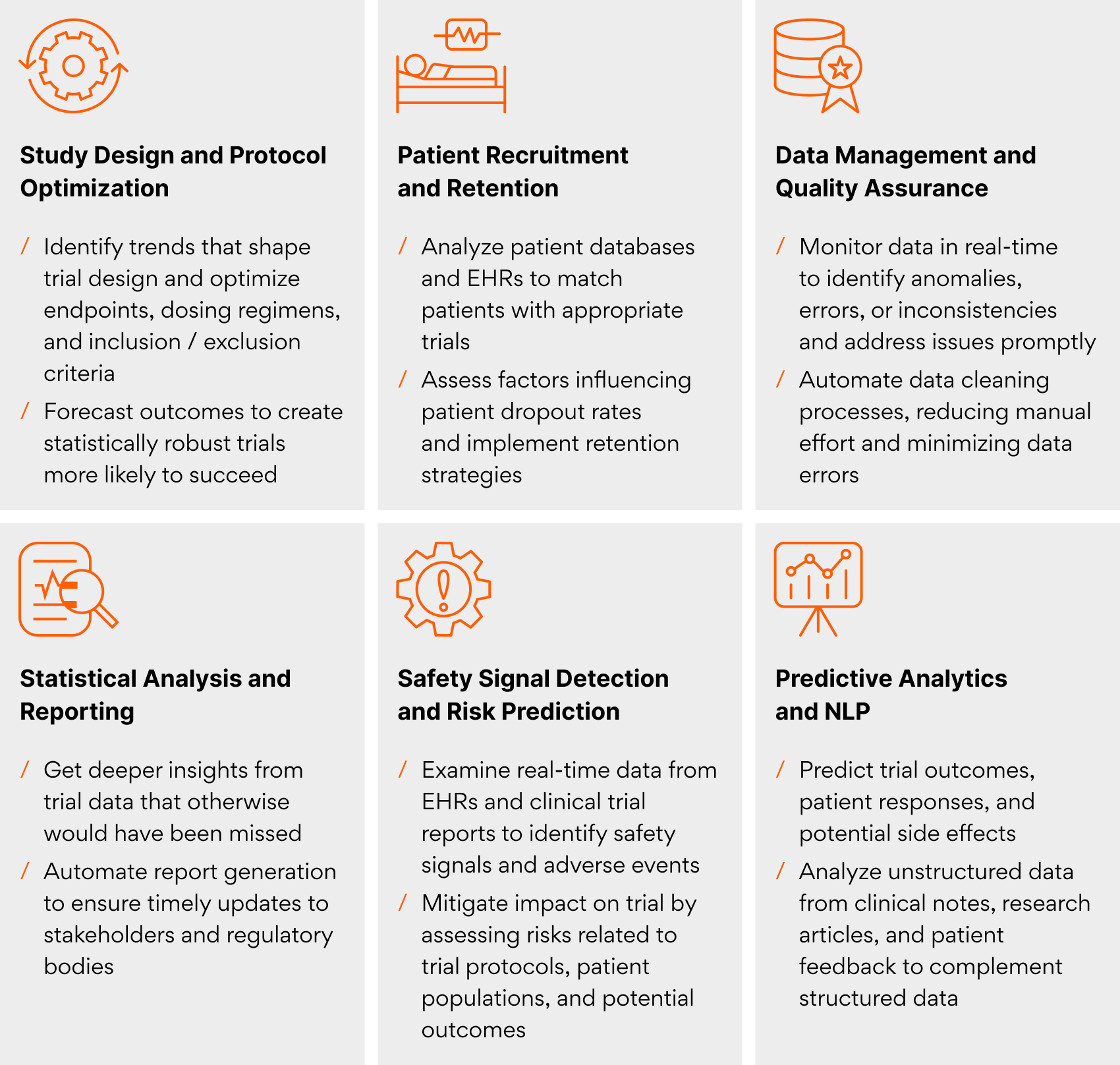Despite spending billions on drug discovery, 88% of drugs that make it to clinical trials fail to receive approvals, and if they do, only one in ten drugs becomes a blockbuster. This low success rate often reduces the incentive for pharma companies to innovate or venture into new drug possibilities, leaving us with some 7,000 diseases with no effective treatments.
Apart from misfires in selecting the patient cohort, defining the disease parameters, or aligning with regulatory expectations, the primary cause of this low success rate is the lack of understanding of how molecular components interact to make the intended effect on the target entity while avoiding adverse events. All these factors boil down to the lack of timely access to data.
Contract Research Organizations (CROs) that steer different stages of pharmaceutical firms’ drug development processes are best positioned to help. The big data they have at their disposal— the volumes of data collected over years of supporting clinical trials across pharmaceutical firms, patient cohorts, and drug compositions—can help them assess the probability of success earlier in the development process.
The prevalence of process automation, AI, machine learning (ML), and Generative AI (GenAI) in big data analytics is creating better industry alignment – from pre-market drug development to post-market business outcomes. By aiding decision-making at each stage – from patient cohort selection to identifying the most promising compounds — GenAI can analyze volumes of structured and unstructured data to fast-track the drug development process by 30%, saving 20% of the investment in research and development.
How Data Analytics Can Streamline CRO Value Chain

Setting the Stage for Data Analytics in Drug Development
However, developing analytical models based on these datasets and leveraging them through AI and GenAI to accelerate drug development requires attention to specifics. CROs that are commencing their data analytics journeys face challenges such as:
- Data Availability: Data from historical projects could be stored in siloed systems or different formats, deleted or lost due to system failures, or inconsistent or inaccurate due to manual entries, leading to information gaps that make it difficult to analyze data cohesively to make forward-looking predictions.
- Data Portability: Lack of data standardization can lead to portability issues. CROs would have to spend considerable time and effort in complex data conversion processes to migrate large data volumes and complex data relationships that need to be maintained across systems to ensure data integrity and consistency.
- Data Privacy & Security: Data maintained by CROs is subjected to data privacy and security regulations, such as HIPAA, which requires explicit consent from data subjects or consent waivers to use the data beyond the purpose for which it was initially collected. CROs must establish robust governance policies and guardrails to ensure cross-leveraged data is properly consented and compliant with applicable laws.
- Data Integration: To adequately leverage analytical capabilities, CROs must ensure data is integrated in real time with minimal latency, requiring niche expertise and resources. Roadblocks could include API limitations, scalability issues, and inefficiencies in extracting, transforming, and loading processes.
An Analytical Leg-Up for CROs
To analyze data and glean insights that accelerate time to value, CROs need a data platform that solves the above-mentioned challenges and creates data linkages and synergies to unlock hidden patterns and correlations.
Persistent continuously invests in innovation to meet the needs of the pharmaceutical industry. Our in-house R&D unit, Persistent Innovation Labs, has created accelerators aligned with the biopharma industry’s needs, including CROs, to ensure drug development success. With a three-decade focus on AI and data, GenAI has resulted in powerful accelerators that streamline various bio-pharma functions such as genomics, molecular biology, drug design and discovery, vaccine design, and more.
One such accelerator is Persistent iAURA, which empowers CROs with AI-powered data insights through seamless data migration, DevOps for AI and ML, explicit focus on data privacy and security, and integration with robust data platforms and large language models (LLMs). It acts as a technical foundation, ensuring every aspect of data management is considered to deliver more efficient, faster, and highly accurate decision-making with:
- Seamless Data Integration: iAURA enables CROs to expedite data migration with GenAI-enabled tools that migrate legacy business intelligence tools and data warehouses to other platforms. It also streamlines ETL (Extract, Transform, Load) migration and rationalizes reports with an ML-based framework that accelerates turnaround time with minimal human intervention.
- Under-the-Hood Data Management: With iAURA, CROs can seamlessly reconcile data sources, auto-detect data anomalies during data ingestion, and automate data profiling and rule recommendations using unsupervised ML. It also empowers them to generate unstructured and structured synthetic data to support predictions for unchartered trials.
- Ready-to-Use Data Platform: iAURA offers managed data and AI platform services contextualized for CROs. These services leverage enterprise databases and are overlaid with robust data governance guardrails to ensure privacy and security. This helps CROs create GenAI experiences quickly, efficiently, and responsibly without the heavy lifting required for setup.
- Conversational Insights: iAURA offers GenAI-based enterprise intelligence for automated insights from business data. With guided chatbot interfaces, iAURA uses retrieval-augmented generation (RAG) to extract semantic relationships within datasets and document libraries, allowing business users to query databases, find outliers, and generate reports directly.
Assure Success with Persistent
Persistent accelerators such as iAURA are already having an industry impact. For instance, LungLife—an American diagnostics company focused on using technology for early lung cancer detection—turned to Persistent to help it analyze approx. 15,000 microscopic images per patient with AI and ML. Persistent trained the ML model in deep learning-based segmentation and deployed annotation tools to boost accuracy based on the available data. We also developed a UI-based solution to help LungLife efficiently verify and classify cancer cells from normal cells, accelerating time to early-stage detection by 70%.
We can help kickstart your organization’s data analytics journey too. Get in touch with us today.
Author’s Profile
Amit Deshpande
Senior Engineering Delivery Partner







